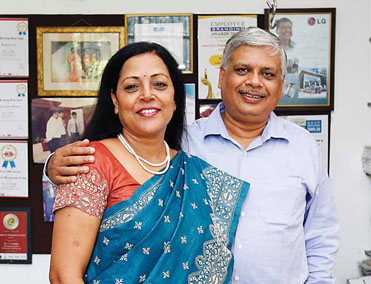
Dr Yasho Verma, formerly with LG Electronics and Tata Steel over long periods, who now consults for the World Bank and participates on the board of several companies believes there is strategy to good HR, and stands by a life led by ethics. His wife Sandhya, who entered the working world of computers in its halcyon days with the Tatas and experienced first-hand its evolution over the years as she worked with several leading IT and soft ware companies, endorses the virtues of patience and magnanimity—both at home and the workplace
Dr Yasho Verma was in the global hierarchy of LG Electronics Inc. since 2008. He has rich experience of over 34 years in the corporate sector. He served as Chief Operating Officer / Director of LG Electronics India Pvt. Ltd. from 2010 to June 2013. He served as the Chief Executive Officer of MIRC Electronics Limited from July 2013 to January 2014.
Dr Verma was associated with LG Electronics from 1997 since its inception in India. He was head of Human Resource until November 2009, after which he spearheaded LG operations in India as COO, and later in sales and marketing and related functions.
Dr Verma started his career with Tata Steel 1981 and continued to be associated with them for about 15 years.
He is now consulting with the World Bank. He is on the Board of Dena Bank since March 2015. He is also on the Board of a few corporates and reputed management institutes. He is adviser to Videocon and some other corporates. He writes regularly for Business World Online, Exhibit and others on topics related to management and innovation etc.
He has given guest lectures at the London Business School, Seoul University, and Wharton Management School, Philadelphia besides other premier management institutes in India. He has also authored a popular book, ‘Passion: The Untold story of LG in India’ which emphasises individual excellence for a growing organisation, customisation of values for employees and empowerment to individuals.
He was awarded the ‘HERETIC’ and ‘GALLUP’ awards by Business Today in 1999 and was featured on its front page. He has been conferred with an Honorary Fellowship by the All India Management Association for his significant contribution to professional management. He was also the winner of the ‘Exemplary Leader Award’ at the World HRD Congress 2009. He has delivered several lectures in India and abroad and has addressed Boards of prestigious companies in India and abroad viz., ITC, HLL, JK Group, Ispat Group and others. He has received various prestigious awards for his outstanding work in the field of HR.
Sandhya Verma did her graduation and then Master's in Physics in 1982 from Banaras Hindu University. She has over 33 years of IT Industry experience in various roles including IT Operations and Delivery, IT Consultancy and Training. She has experience of working with leading IT services and product development companies like NIIT (Factory Head), Nucleus Software Exports (Vice President), Velocient Technologies (Vice President Operations), Tata Steel (Manager) and Institutes like IMI, Delhi (Adjunct Professor). She has built and led highly successful businesses that implemented multimillion dollar projects globally for various industries and business verticals including Banking, Manufacturing, HR, Government, CRM, etc. She is also an entrepreneur who has set up a software consultancy providing project management, software services and IT training and HR consultancy providing HR solutions.
Corporate Citizen spoke to the dynamic couple, who with extreme patience, maturity, mutual understanding and peace, have made a success of their marriage and career. Truly Inspiring...
"The job of handling labour unrest is no joke. But my young age, and lack of knowledge of the dangers of dealing with these things helped me go ahead with the task, undeterred -Yasho Verma"
You have just got into your bed to sleep at your usual time of 9.30 pm and are suddenly woken up and told that your engagement ceremony is RIGHT NOW. What would you do? Just get up, get dressed and get engaged! Sandhya and Yasho Verma, leading corporate leaders, began their life’s journey together, precisely this way. Yasho, who hails from Lucknow, had joined Tata Steel in Jamshedpur. His parents had come on a visit to Jamshedpur to meet her family and her of course, but it was to be just an introductory visit. However, the elders of both the families decided– why just meet and go? The day being Dassera, the most auspicious muhurat in a Hindu calendar, they decided not to let go.
YASHO: Actually, I belong to Lucknow, so my parents came to visit me in Jamshedpur and they met her parents too. Later in the evening, the elders decided that we should get engaged that night itself. There were no mobile phones at that time. It was about 8 or 9 pm. They started looking for me but I was out of the house. At around 10.30 pm when I got back home, my landlord—since he was informed about this development on the landline—told me to go to Sandhya’s house, as they wanted to talk to me. So I went there. They announced the engagement ceremony right away. They had already contacted a Panditji, who also confirmed that it was very auspicious and I was asked to get ready.
SANDHYA: Since I used to sleep early, I was woken up at 9.30 pm; he was located by 10.30 pm. In the meanwhile, a ginni (a gold coin) and rings were required for the engagement ceremony. Since the shops were closed, my parents went to the house of the jeweller and procured them. The photographer was also located, but he only had a black and white roll, so we had to make do with that. So, finally we got engaged by around 11 pm that night. My parents, brother and bhabhi, his parents and his friend were present for the ceremony. We were engaged in October 1982 and got married two months later in December.
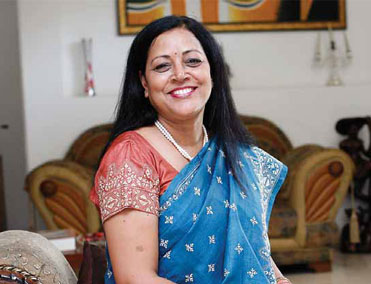
Adds Sandhya, “We probably met only once before all this. The prospect was discussed between the elders of the family and after that they asked us for our approval. Frankly, in those days we didn’t think much about judging a person, or the future prospects of the prospective groom. It was more a matter for parental consideration on such issues. Incidentally, for me, it was the first proposal and I simply went ahead with what my parents suggested.”
YASHO: My first job was with Tata Steel, Jamshedpur, which I joined in 1981. I used to visit her place as our families were known to each other. She was studying at Banaras Hindu University at that time. She then began working for the Tatas in 1982. We met once or twice in the office as well. However, the matter of an alliance was something that was to be strictly discussed between the parents from both sides.
SANDHYA: He never wears his designation on his sleeve when he is at home. I have never seen him behave like a corporate bigwig in the house. He is humble and unassuming. I am the one who decides which clothes he should wear and so on. I was the one who would talk a lot; he was the quieter one. I would lose my temper but he would not. And we never ever had any fights. If I was arguing, he would keep quiet. And in all these years, I too learned this trait from him. If he lost his temper, which was rare, I would keep quiet. We never had any full-fledged argument or experienced any disharmony. He taught me how to be patient and listen to others’ viewpoints. He is very good with children too; playing with them, he would forget everything else.
YASHO: She is bubbly, socially very smart, much smarter than me, also very sharp. She is very good at creative things like painting, and she keeps her-self very busy with such hobbies.
"Frankly, in those days we didn’t think much about judging a person, or the future prospects of the prospective groom. It was more a matter for parental consideration on such issues -Sandhya Verma"
Yasho did his mechanical engineering followed by an MBA with specialisation in HR. Later, he also did his PhD from IIT, Kharagpur in 1991.
After her post-graduation in Physics, Sandhya joined Tata Steel in 1982 as an assistant engineer, i.e. a software programmer. In those early days of the computer, she started working on mainframe and used COBOL. Says Sandhya, “The company was looking for candidates with a background in Mathematics, Physics or Statistics. Mathematics and Statistics being my graduation subjects also helped. So after qualifying in the written and aptitude tests, I joined there.”
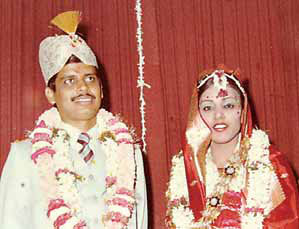
SANDHYA: Yes it was a completely new experience and it was very interesting. I had only theoretical knowledge of computers as Electronics was my major subject for MSc Physics. I had never operated a computer. The first day when I walked in, there was this big, huge mainframe. I went in and looked at things and somebody asked me to do something. I had no clue, what it was. There were two other girls, who were already working there. I was the new entrant. So they nicknamed me ‘Alice in Wonderland’ because it took me a couple of days to get accustomed to the department and the small team.
The good thing was that the Tatas put a lot of emphasis on training. We had very interesting experiences. At that time, we had mainframe, which had green terminals, through which you could log in to get access to the computer. You needed to type ‘hello’ and it would then start. A newcomer joined six months later. A senior person told him to say ‘hello’ (he actually meant, type the word) to the machine. But he stood near the terminal and began saying “Hello, hello,” hoping it would get started.
The complete evolution of computers to this day - I can say I have seen that.
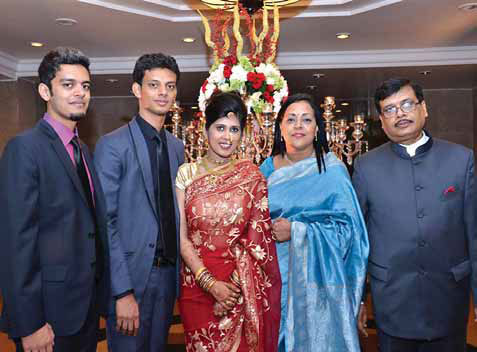
SANDHYA: Nowadays, some prior experience or learning in computer is a must. The good part about us was we were like a clean slate, grasping and following all that was taught to us, on the job. But now you are required to have a very formal background. There are so many specialisations now and people have to decide early on where they want to go. As technology keeps progressing, so does specialisation, which is very, very keen now.
SANDHYA: Like in any other field, specialisation is required, so it is good. However, for us, because we didn’t have the luxury of owning computers—it was all rationed with time slots. So whatever little time that we got, we had to make the best of it. Now, things have changed for the better. However, the young generation today needs to be more organised in putting their thoughts together and deciding what they want to do, rather than hitting the keyboard and thinking on the fly.
"We never ever had any fights. If I was arguing, he would keep quiet. And in all these years, I too learned this trait from him. If he lost his temper, which was rare, I would keep quiet. We never had any full-fledged argument or experienced any disharmony. He taught me how to be patient and listen to others’ viewpoints -Yasho Verma"
SANDHYA: I was lucky that the organisations I worked for put a lot of effort in training. When I joined NIIT, Delhi in 1994, I got the opportunity to learn emerging technologies there. The period 1997-1998 was when the Internet technology was just coming. Some of my clients were government organisations of Singapore like their Prime Minister’s Office, Ministry of Defence and so on. They wanted to know how to work with Internet technologies. So I took that as an opportunity and got into the centre of competence for Internet technologies that was being set up at NIIT. It was an important turning point of my career. Because the world was moving towards the Internet and I just happened to be at the right place at the right time.
Thereafter I was headhunted by other companies and then kept abreast with the technology on my own because once you start, you keep learning and updating yourself. That’s what I kept doing.
"At office, even with your boss, you have to be patient, otherwise the only option is to exit. You can process your thoughts, and try to explain to your boss. Then he too will listen, instead of saying something at the heat of the moment. The same thing applies at home. We also realised, both of us couldn’t be running after our jobs. One has to take the back seat for the family, at some point of time -Sandhya Verma"
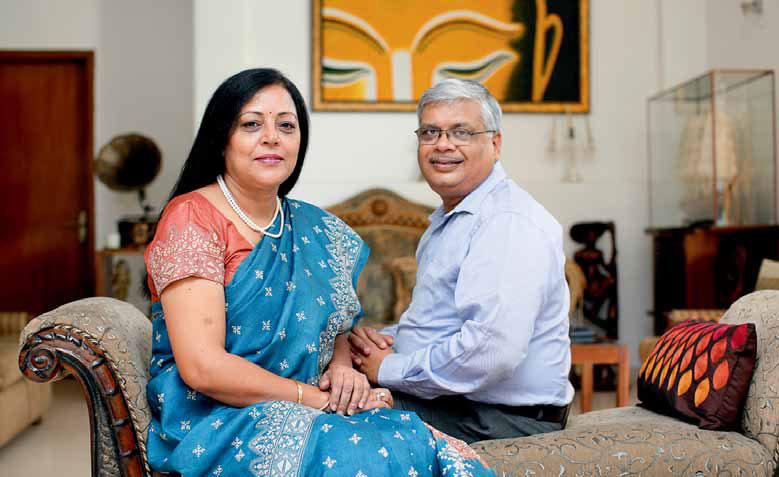
SANDHYA: This is an interesting episode to narrate. Soon after our marriage, I had also learnt to drive the car and used to drive for work. I was relatively new to driving. I used to look methodically, first to the left, then right, while moving out of the parking. Russi Mody loved cars as well as speed. At that time, he had a Toyota. He came to the exit gate, near where my car was usually parked. I had just moved about a foot from the parking area and the next thing I knew was that my car had hit some car and my car was pushed back into the parking slot. And to my horror, I saw it was Russi Mody’s car. Thankfully, my car had hit near the rear door of his car, not the front. Russi Mody was in the driver’s seat. The rear door had a big dent. Jacob, his co-passenger, who was sitting next to him and who knew me, jumped out and came running towards my car. He told me to keep sitting in the car, so as not to be seen by the enraged Mody.
Meanwhile, Mody got out of the car, in all-white clothes, and red with anger. Looking at me he shouted, “Who are you? What’s your name? What are you doing here?”
I said I worked there.
“Which department?” he roared.
I told him everything and I thought my job was gone since he took all the details from me. Then he got into his car and was gone.
Mr Mody was going to the airport, before which he also had lunch with Yasho’s boss, the director, who thankfully knew me. Mr Mody said, “Who is this Sandhya Verma? How dare she hit my car?”
The director said, “As far as I know her, I am quite sure that was not on purpose. And definitely it would be your fault.” This angered Mr Mody. “I say this because you have been driving for longer than her age, so given your experience, it must be your fault.”
As for me, I was quite shaken, and didn’t know what to do. I called one of my friends, a colleague. She told me not to worry, they would see what could be done. She talked to Jacob, a senior. Both of them advised me to write a letter of apology to Mr Mody. I still have his reply in which he said, “Don’t worry. Such things happen in life.”
But that incident made me famous—for days on end people, both staff and workers, would come up and say “How dare you hit sahib’s car”. Even after months and years, people would ask me, how I could hit his car!
YASHO: Actually it is your first or second boss with whom you spend a lot of time, who is the one who makes or kills your career. In my case, when I started my career, the boss, the Director on the Board, Dr. S N Pandey, to whom I was reporting to, was a tough one but he made me learn a lot of things. I was associated with him for eight years at Tatas.
He would leave me to handle any problem or situation entirely on my own, that’s how he made me learn through first-hand experience. And I was quite young, say about 22-23 then, with little experience. I remember, in those early days he told me to handle the wage negotiations of the coal industry, where the union presidents of different coal industries used to be negotiating and political leaders would be backing them. I would be representing the management, the political leaders would be fielding for the workers and there would be strong gangs of musclemen, like in the Bollywood movie ‘Gangs of Wasseypur’.
The job of handling such matters is no joke. But my young age, and lack of knowledge of the dangers of dealing with these things helped me go ahead with the task undeterred. Knowledge can make you drag your feet because you know the scale and complexity of the dangers and risks involved. Then TISCO was in the process of taking over 18 sick companies all over the country. Dr Pandey was the IR (Industrial Relations) and HR person in the team to revive these and I was working on his behalf. The moment TISCO took over, the first issue was union resistance. So how to calm them down was the first big concern.
"I told them that as a strategy, there won’t be any union in LG. Their mind-set was such that they could not think of such a situation. We did some homework and found out that in that region, those who completed their graduation, i.e. 12+3, wouldn’t want to form a union. They might quit for reasons of ego, pride or similar things, but they would not join a union -Yasho Verma"
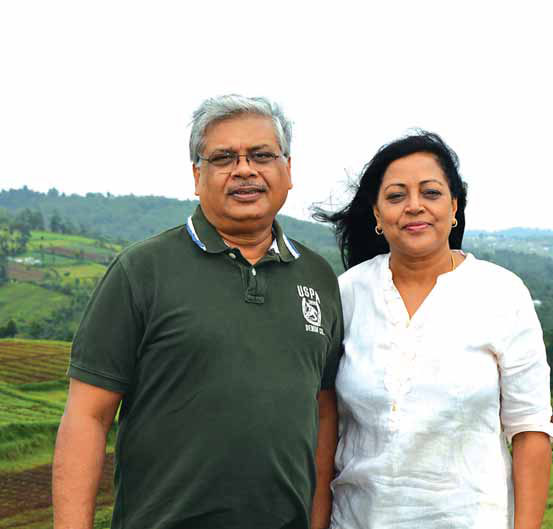
One of the biggest challenges I faced was in 1992. There was a huge strike by tribal workers against TISCO led by the political parties of Jharkhand. There were about 70, 000-75, 000 permanent workers and about 40, 000 to 50, 000 contractual workers employed with Tata Steel. Some of the tribal leaders who led the agitation in 1992, later became chief ministers of Jharkhand and central ministers. They wanted the tribal workers to be made permanent. That time Laloo Yadav and Mr Mody had a disagreement and the state administration had stopped cooperating with TISCO. So there was huge pressure and processions. I was No. 2 in the factory HR and Personnel. Mr. Mody decided to make some 10, 000 workers permanent. That, I think, opened the floodgates; the agitation intensified as the rest of the contractual workers wanted to be made permanent as well.
One morning when I entered the office, I saw that thousands of people were gathered outside the gate of Tata Steel. They were surrounding the very high gate and were armed with bows and arrows. They were trying to break open the multiple gates. Finally, they broke the power engineering gate and kept on walking. We were sitting in the middle of the factory, at the General Super-intendent’s Office. We all came out. They were going to the blast furnace. In the blast furnace, you have to feed coal every four hours through trains. Wagons and bogies full of coal go towards the furnaces, to feed it. The Hiline is 60 feet high where the track goes and there were no railings on the stairs leading to the Hiline. The mob started going up through the stairs on the Hiline and blocked it, not allowing the bogies to reach the blast furnace. It was a dangerous situation. If the coke is not fed every four hours, there would have been a bigger disaster than that of Union Carbide. We didn’t know what to do. We called the union people; we arranged 50-60 trucks—TISCO had this infrastructure. The trucks arrived. Suddenly someone from us got up, acting on instinct, went to that Hiline and grabbed one worker and brought him down. That worker came down quietly. Similarly, another man was brought down. This way, the men were put in the trucks and sent away safely, thankfully relieving us from the fear that dozens of people might have died from the fall in the hustle.
I left TISCO in 1993, and became Vice President, HR and Administration at Usha India. Then I went to the Jindal Group. I was there for about two years. Then I joined LG in 1997.
YASHO: It was an absolutely different culture and I became a part of that. At Tatas, decision making is slow and more centralised. Back then, you had to write notes and send a letter to your boss, before a decision would be made. Here, you had to decide immediately. I would say it was like a river flowing on a plain at Tata Steel, and at LG it was like a river coming down from a mountain, rushing, forcing its way, colliding.
"Like all parents, we wanted our children to do well. But one thing we were very careful about was not to pressurise them to become high rankers and achievers at the cost of developing balanced personalities -Sandhya and Yasho Verma"
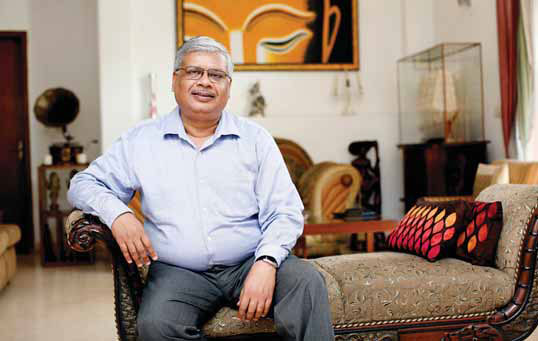
YASHO: There were different strategies. For the LG Pune unit we recruited Sachin Saxena and Shyam Khonde as the factory head and HR head respectively, in 2002-2003. Union leaders are professionals, with all the connotations of the word. I knew that the strategy that worked for LG Noida would not work here. We had begun recruiting seven or eight months before the construction of the factory had started at Ranjangaon. I told them that as a strategy, there won’t be any union in LG. Their mindset was such that they could not think of such a situation. We did some homework and found out that in that region, those who completed their graduation, i.e. 12+3, wouldn’t want to form a union. They might quit for reasons of ego, pride or similar things, but they would not join a union.
"Like all parents, we wanted our children to do well. But one thing we were very careful about was not to pressurise them to become high rankers and achievers at the cost of developing balanced personalities -Sandhya and Yasho Verma"
YASHO: We did a survey and came to this conclusion. Then I called Sachin and Shyam and said we will only have graduates and even for unskilled workers we would get graduates with ITI training. They said we won’t get any at all. But they were able to find such persons, after we advertised in newspapers and from online job sites. We also took people from different regions – from Southern Maharashtra, some from Gujarat, to ensure diversity of culture. The other strategy was, we promoted those who were sharp and had leadership skills and made them supervisors. And I personally sat at every worker’s interview. We took only the extremely needy ones so that they would only focus on work. These were tactical considerations.
No, we were very careful. We used to conduct interviews outside the factory, somewhere in Pune city. The factory HR head and his team would go to different states and recruit. And we fulfilled the legal liabilities. If it is mandatory to recruit certain percent from Maharashtra, then we would take people from different parts of Maharashtra. There might have been some incidents involving some local guys, under the guise of upholding the interests of the ruling community there, creating trouble in the process. However, these would have been sorted out at the level of the factory HR head.
LG’s first factory was set up in Noida. There were about 5,000 to 6,000 workers. Pune and Noida were completely different. I had about nine months to set up branches all over the country. I had eight months to observe Daewoo (the competitors). Here my strategy was absolutely different. LG was a new entrant. I spread the word that I was close to the top leaders in the central government and that I met them over a cup of tea every fortnight. This was far from true. In fact, some politicians used to ring me up, requesting me to help make them ministers! Secondly, with any issue which started with the locals, if I knew at the beginning that I would win, would fight it out and publicise it, however insignificant it was. We gave the impression that LG could not be beaten. If I knew we would lose with the locals, that they would remain united against us, then even if it was an issue involving a crore of rupees, we gave the impression initially that ours was a large-hearted company. So the impression created was that if you want to get something good from LG, become a friend of LG, don’t fight with it.
SANDHYA: We had, from beginning, decided that there would be no talking shop after coming home from work. I didn’t find it odd because I had seen the same in my family. My father, SL Srivastava was a senior GM at Tata. He was in charge of modernising the Tata plants. My father once completed a Rs.12,000-crore project a good six months ahead of schedule, but never did he talk about it at home. And yes, talking about office politics at home was unheard-of. So I was used to that. And we continue the same here as well.
YASHO: Ours is a freedom fighters’ family. We lived in a joint family. My uncles were freedom fighters, served different terms in jail, even in the Andamans. If you have watched the movie, ‘Shaheed’, many of the characters of the film were alive when I was born, I have seen them in my house when I was a child. My uncle was a minister. My father, Umendra Verma was the permanent secretary to the UP Congress party legislature.
SANDHYA: Jamshedpur was a nice place to bring up children. I used to drop our sons Kushagra and Akshil, at my parents’ on my way to work. Thankfully, the schools were quite close by. Staggered lunch break timings (fortunately one and a half hour for my department) and our different work timings also helped in taking care of our children. So that was a huge support.
Like all parents, we wanted our children to do well. But one thing we were very careful about was not to pressurise them to become high rankers and achievers at the cost of developing balanced personalities. However, we did tell them that if they did not study well, they would have problems in the future. We made them sensitive towards that. We also made them take their decisions. They grew up to become responsible and independent individuals. Both our sons are working in the IT industry. Our elder son is with HPCL-Mittal. The younger son is a software engineer at Infinite Computer.
"I would say, decision making was like a river flowing on a plain at Tata Steel, and at LG it was like a river coming down from a mountain, rushing, forcing its way, colliding -Yasho Verma"
SANDHYA: You have to give time and be open to give in. You should be able to talk, open up and share, discuss and of course, give space. I would like to give you an example. He was aware that I too was working, so when I came home after working, driving an hour and a half through Delhi traffic, I would be tired. Even though we often entertained guests at our place, he would suggest we ordered food from outside so as not make me buckle under the extra work load.
YASHO: Patience, space and understanding and trying to make the other person happy is the key to a happy marriage.
YASHO: Whatever position I reached, I was never aspirational. And I always believed in process and ethics. I never thought of achieving success at somebody else’s expense. Patience is what the younger generation lacks. They are under stress because the demands are very high. And they want to reach much higher than their competence. This is the dilemma. I never thought that I would be a CEO one day. For me, it was always, do whatever you are doing whole heartedly. Because when you are into it, you will do a good job. And don’t get into politics. I never indulge in that. Do your job in the best possible manner, give results and then think about it no more, has been my way. I might have suffered too, but that’s it.
SANDHYA: I agree with what he has just said. At office, even with your boss, you have to be patient, otherwise the only option is to exit. But you can take time, process your thoughts, and try to explain to your boss. Then your boss too will listen, instead of saying something at the heat of the moment. The same thing applies at home. If you are being patient there, be patient here as well. As a couple, between the two of us, we decided that both of us couldn’t be running after our jobs. One has to take the back seat for the family, which, in most marriages nowadays, doesn’t happen. You have time, later on, to catch up. Give some time, people do understand that you have family commitments. And if you are good, people are sure to co-operate.
SANDHYA: For me, it is, be happy. Don’t hold grudges about what one said, what one did.
YASHO: I live by values. I might be a corporate manager, but basically I am a philosopher and a spiritual man. Till class XII, I even used to write stories which would get published in Dharmayug. I read non-fiction, whereas she reads fiction. In our library, we have thousands of books. Every Diwali, we used to buy books worth about RS.10,000 to Rs.15,000, which we would read over time.
SANDHYA: Books, music, movies, theatre and holidays! We like to go to places we have not visited, in India and abroad.
YASHO: I like to see movies and theatre, read books and spend time with the family.
BY VINITA DESHMUKH